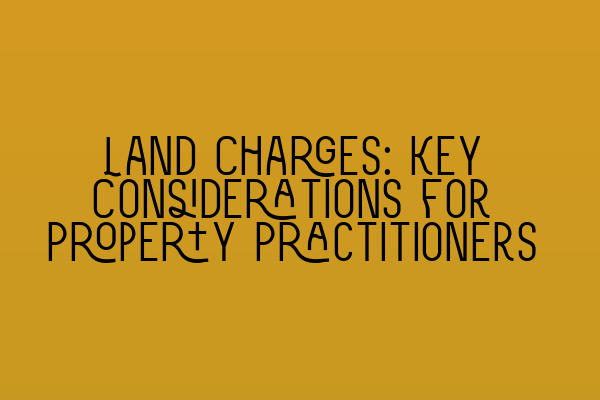Welcome to SQE Property Law & Land Law! In this blog post, we will discuss the key considerations for property practitioners when dealing with land charges. Land charges are an important aspect of property law and can have a significant impact on the ownership and use of land. We will explore what land charges are, their significance, and how property practitioners can navigate the complexities associated with them.
What are Land Charges?
Land charges are legal interests or rights that are registered against a property or land. They serve to protect the interests of third parties who may have an interest in the property, such as lenders or creditors. Land charges can be created through a variety of means, such as agreements, court orders, or statutory requirements.
Key Considerations for Property Practitioners:
1. Registering Land Charges:
When a property practitioner is dealing with a property transaction, one of the crucial tasks is to search the relevant land charges register to identify any existing charges on the property. It is vital to conduct a thorough search to ensure that all relevant charges are identified and taken into account during the transaction. Failure to identify and address registered charges can lead to complications and disputes in the future.
2. Types of Land Charges:
There are various types of land charges that property practitioners need to be aware of. These include but are not limited to:
– Restrictive Covenants: Restrictive covenants are obligations imposed on the owner of the land, limiting the use or development of the property.
– Mortgages: Mortgages are a common form of land charge, whereby a lender has a legal interest in the property to secure repayment of a loan.
– Easements: Easements grant certain rights over another person’s property, such as a right of way or a right to access services.
– Judgments and Orders: These are court judgments or orders that may affect the ownership or use of the property.
– Planning Obligations: Planning obligations are agreements entered into with the local planning authority, imposing conditions on the use or development of land.
Understanding the different types of land charges is essential for property practitioners to assess the implications for their clients and ensure compliance with legal requirements.
3. Effect of Land Charges:
Land charges have legal consequences for the property owner and any potential buyers or lenders. It is crucial for property practitioners to understand the effect of these charges to advise their clients effectively. For example, a restrictive covenant may restrict certain activities on the property or require consent from a specific party before making any changes.
4. Priority of Land Charges:
When there are multiple land charges registered against a property, determining their priority becomes essential. The priority determines the order in which the charges must be satisfied if the property is sold or repossessed. Property practitioners need to carefully analyze the priority rules to ensure that their client’s interests are protected and that any legal requirements are met to transfer or discharge the charges.
5. Discharging or Modifying Land Charges:
In some cases, land charges may need to be discharged or modified to allow a property transaction to proceed. Property practitioners should be familiar with the process of discharging or modifying land charges and the legal requirements involved. This may include obtaining a release or consent from the beneficiary of the charge or making an application to the relevant authority.
Conclusion:
Land charges are a crucial aspect of property law and have significant implications for property owners, buyers, and lenders. Property practitioners play a vital role in identifying, understanding, and managing land charges to ensure smooth property transactions and protect their clients’ interests.
If you want to deepen your knowledge of property law or other related areas, such as contractual capacity, interactive SQE mock tests, or SQE webinars, consider exploring our related articles for further insights:
Understanding Contractual Capacity: Rights and Limitations
Interactive SQE Mock Tests for Contract Law: Test Your Knowledge
Join Our SQE Contract Law Webinars: Expert Insights and Guidance
SQE Prep: Mastering the Essentials of Contract Law
Contractual Capacity: Understanding Legal Competence in Contracting Parties
At SQE Property Law & Land Law, we are committed to providing expert guidance and support to property practitioners. Contact us today to learn more about our services and how we can assist you with your property law needs.
